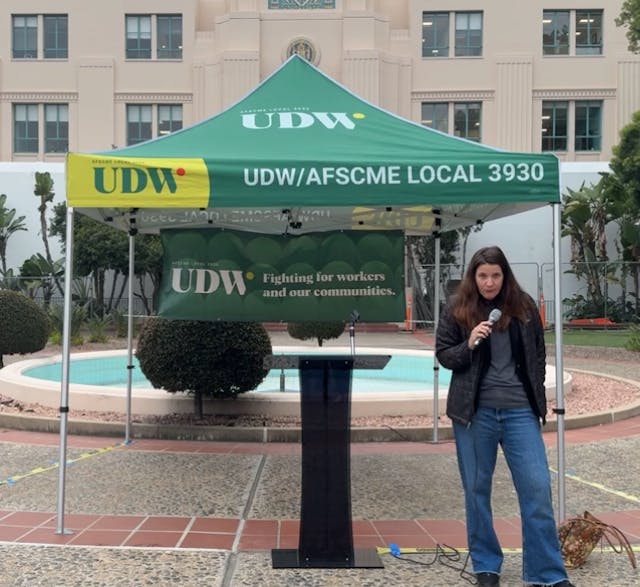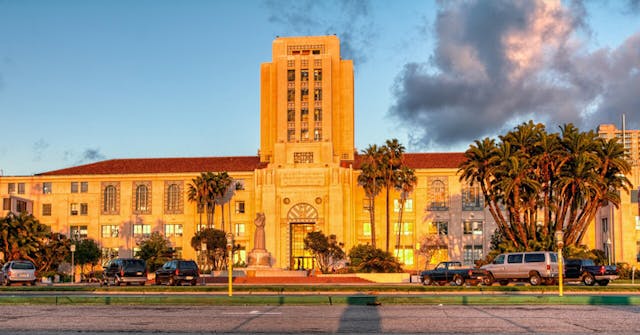SD City's Lawyer Confirms Maienschein Eligible to Run for City Attorney
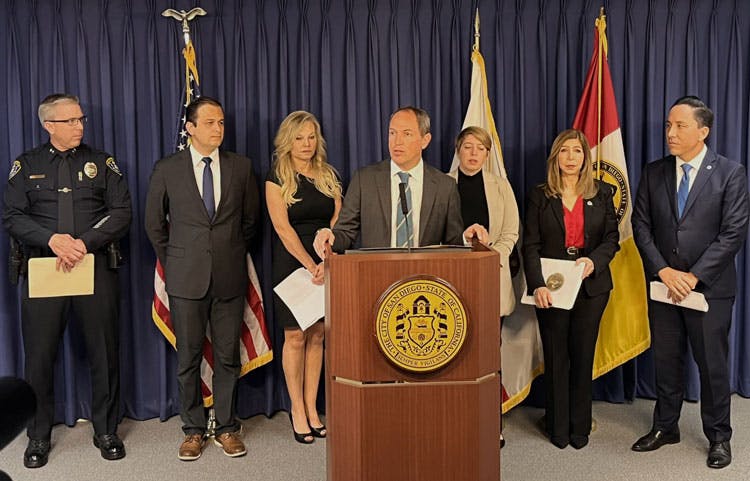
An outside municipal law expert hired by San Diego City Attorney Mara Elliott's office has confirmed that State Assemblyman Brian Maienschein meets the qualifications to run for City Attorney in next year's election after his opponent raised issues with the status of his law license.
Heather Ferbert, who is currently the Chief Deputy City Attorney under Elliott and is running to replace her boss who will be termed out of office next year, raised doubts that Maienschein met the eligibility requirements set out in the City's Charter.
The City's Charter Section 40 requires that candidates for the position of City Attorney "must be licensed to practice law in the State of California and must have been so licensed for at least ten years at the time he or she submits nominating petitions."
Ferbert's campaign claimed Maienschein did not meet the requirements because the Assemblyman had his law license on "inactive" status during most of the time he has been in elected office, including during his eight years on the San Diego City Council and nearly 12 years in the State Assembly.
Maienschein, 54, became a licensed lawyer in 1994 and worked as a private attorney for six years before being elected to public office. He placed his law license on inactive status while he served in office but returned to active status this year as he prepared to run for City Attorney.
In response to Ferbert's accusations, City Attorney Mara Elliott hired outside legal counsel at taxpayer expense to study the issue and render a legal opinion on Maienschein's eligibility.
This week, attorney Fred Galante, Special Counsel from the law firm of Aleshire & Wynder, returned his legal opinion after researching the Charter issue as requested by Elliott and concluded that a candidate who had a license on inactive status still meets the Charter's eligibility requirement.
"The above excerpt from San Diego City Charter Section 40 does not prevent someone who was listed as inactive for some of those required ten years from becoming a nominee for that office. In other words, the term “licensed,” as used in Section 40, includes the period during which the attorney may have been listed as inactive," Galante wrote in his legal opinion.
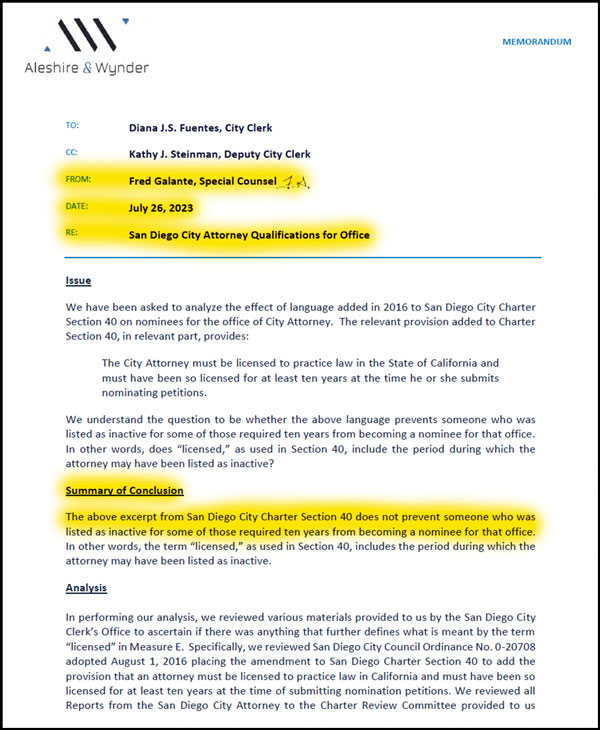
Read the full legal opinion letter here.
Voters passed Measure E in 2016 which amended the City Charter to add a requirement that candidates for City Attorney must have been licensed for at least 10 years at the time of filing to run for the position as the City's chief legal advisor. Before 2016, the Charter did not require that the City Attorney even be an attorney.
Ferbert's campaign began attacking Maienschein's eligibility in a March 27, 2023 press release by asking whether he "is even eligible to run for San Diego City Attorney."
Maienschein dismissed the accusations, saying the issue was not complex and criticized the City Attorney's office under Elliott and Ferbert for wasting taxpayer dollars on a political attack.
“This is not a complex legal issue. The law is clear,” Maienschein said. “My opponent’s campaign is recklessly attempting to cause confusion and is abusing her connections in the City Attorney’s office for a transparently political purpose. It is disappointing that taxpayer dollars are being used to hire expensive attorneys to prepare an analysis that is completely unnecessary,” he added.
Ferbert herself refused to make any public statements about Maienschein's eligibility, instead using her campaign consultant and surrogates to deploy the attack.
Legal experts who reviewed the issue over the past two months also concluded that the issue would not prevent Maienschein from running, citing two previous high-profile cases with similar circumstances where both survived legal challenges.
In one case, then-California Attorney General Xavier Becerra was sued in 2018 over state law requirements that the Attorney General must have "been admitted to practice before the Supreme Court of the state for a period of at least five years immediately preceding his election or appointment to such office."
Much like Maienschein, Becerra had been a lawyer for six years before entering politics but then placed his license on "inactive" status when he served in the California State Assembly from 1990 to 1992 and in Congress from 1992 to 2017.
A district court and the 5th District Court of Appeals upheld Becerra's eligibility to serve as Attorney General along very similar lines to Maienschein's situation.
"An inactive attorney unable to engage in the practice of law remains admitted to practice in California and may accrue time towards eligibility for the office of Attorney General of California. An attorney who chooses voluntary inactive status is not thereby disqualified from accruing eligibility for the office of Attorney General,” the appellate court ruled.
In 2007, a Sacramento Superior Court judge threw out a nearly identical case challenging California Attorney General Jerry Brown's election because he had his law license on "inactive" status while he served as Mayor of Oakland. Brown went on to serve a full four-year term before being elected Governor in 2010.
In both cases, judges ruled that inactive status did not constitute ending an attorney's license and, therefore, did not bar the candidates from meeting the time period required under state law.
In May, Maienschein released a two-page letter from election law attorney Stephen J. Kaufman to City Attorney Mara Elliott clarifying that, based on existing case law, there is no issue with Maienschein's eligibility and asking Elliott to "cease from any further consideration of this issue."
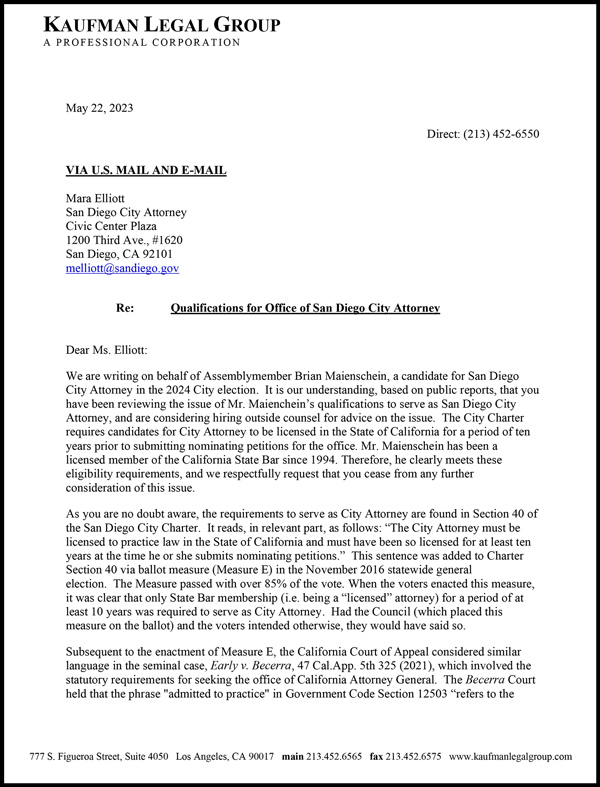
Read the full legal letter here.
"Since Mr. Maienschein has been licensed to practice law, i.e., a member of the State Bar, for almost 30 years, he clearly meets the eligibility requirements to serve as San Diego City Attorney under the City Charter requirements," Kaufman wrote to Elliott.
Nonetheless, Elliott still went forward with hiring Galante to conduct his own legal research. Galante's letter not only cites Becerra's case, but also points to California Business and Professions Code sections relating to lawyers where it details that "licensees of the State Bar are divided into two classes: (a)Active licensees. (b)Inactive licensees."
"It is clear there are two types of licenses issued by the State Bar, one of which is inactive. In addition, language similar to that in Section 40 of the San Diego City Charter appears in Article VI, Section 15 of the California Constitution. Section 6005 provides that a person with an inactive license meets the 10-year requirement set forth for in Article VI, Section 15 if the reason that person holds an inactive license is made at that person’s request," Galante wrote in his legal opinion letter.
Galante's opinion letter closes with a direct conclusion that a candidate who has held an active or inactive license for at least 10 years in eligible to run and be elected as City Attorney.
"A person seeking to be elected to the position of San Diego City Attorney is eligible to run for and be elected to the position of San Diego City Attorney if the person holds an active license and if that person held an active license or, at his or her request, an inactive license from the State Bar for at least ten years when submitting a nominating petition.
Although Maienschein has not practiced law while in office, he has served as the Chairman of the State Assembly's Judiciary Committee that approves all pending legislation relating to family law, product and tort liability, Civil Code, and Evidence Code, and has taught an election law class at the University of San Diego School of Law since 2016.
Maienschein also serves on the State Judicial Council, the policymaking body of the California courts. Maienschein is one of only two state legislators appointed by the Chief Justice of the California Supreme Court. All members of the Judicial Council must be lawyers or judges.
After completing his Bachelor's degree at the University of California Santa Cruz, Maienschein earned his law degree from California Western School of Law in San Diego and was admitted to the California State Bar in December 1994. He worked for the law firm of Chapin, Fleming & Winet until his election to the City Council in 2000.
Maienschein later served on the San Diego City Council from 2000 to 2008 and ran for City Attorney in the Primary Election in 2008 against then-City Attorney Michael J. Aguirre in a race that also included State Assemblyman Jan Goldsmith and San Diego City Councilman Scott Peters. Goldsmith later defeated Aguirre in the November 2008 General Election.
Now a registered Democrat, Maienschein was first elected to office as a registered Republican, before switching parties in 2019. He was re-elected to the Assembly as a Democrat in the November 2020 election and again in 2022, and will be termed out of office in November 2024.
Maienschein received the endorsement of the San Diego County Democratic Party over Ferbert in May after earning 75% of the votes of the membership.
Ferbert, 42, also a Democrat, earned a Bachelor’s degree from CSU Long Beach and a law degree from the University of San Diego (USD) School of Law. She became a licensed attorney in December 2006 and has worked for the City Attorney's office since 2014 after six years of private practice. Ferbert also teaches law school classes at USD.
La Prensa San Diego requested a comment from Ferbert for this story and also asked if she and her campaign would stop using the issue of eligibility as an attack on Maienschein after the City Attorney's special counsel opinion letter was received.
Ferbert's campaign would not provide a comment from her, but her campaign consultant, Daniel Rottenstreich, did provide his own comment which was dismissive of a "government lawyer" and wrong in asserting it was a government lawyer who delivered the legal opinion.
"Just because a government lawyer threw the guy a life preserver, doesn't make him qualified to do the job, Rottenstriech wrote. "The fact that the city even had to investigate Maienschein's eligibility because his legal experience is so thin tells you all you need to know. The central issue in the race remains that Brian Maienschein is a longtime Republican career politician who hasn’t practiced law in decades while Heather Ferbert is Chief Deputy City Attorney and ready on day one."
Rottenstreich (pronounced "ROTTEN-strike) is not only the current political campaign consultant for Ferbert, but he also ran the 2018 and 2022 election campaigns for Elliott, as well as the 2018 and 2022 election for disgraced San Diego County Supervisor Nathan Fletcher who resigned in May after a female public transit agency employee sued him for harassment and assault.
The Primary Election for City Attorney will be on March 5 2024 and a General Election will be on November 5, 2024.
Read our previous article on this story from June 2, 2023.
https://laprensa.org/sd-city-attorney-campaigns-spar-over-candidates-qualification



 Arturo Castañares
Arturo Castañares
